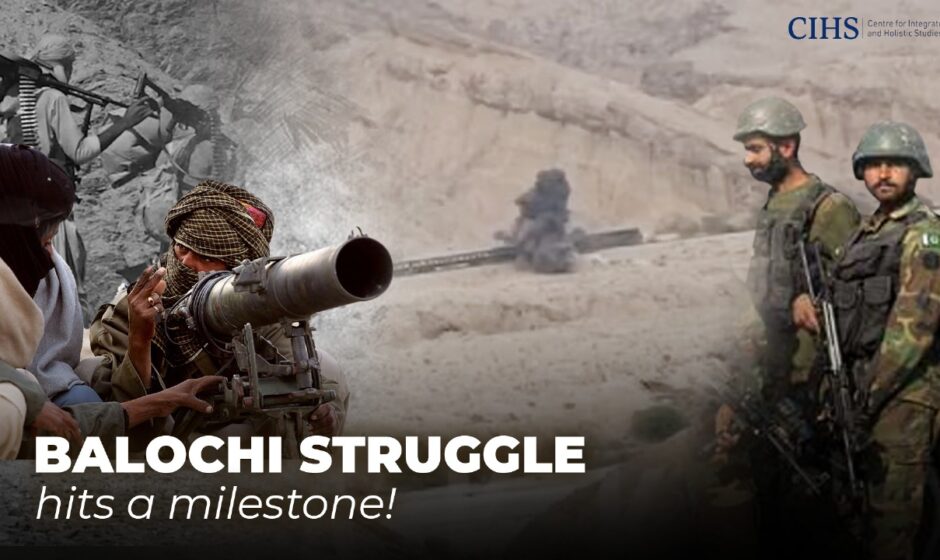Balochi fighters under BRAS with centralized military command pose significant challenges to both Pakistan, China.
Rohan Giri & Dr. Shailendra Pathak
Given continued rejection of their rights, how long can one ignore Balochis’ call for justice?
Balochistan has a long history of identity crisis and struggle for Balochis’ rights that are closely entwined. For decades in continuum, Balochi population suffered political marginalization, financial difficulties and cruel suppression of their dreams.

Evolving Balochi resistance marks a significant shift in this long-lasting conflict, potentially influencing the region’s political dynamics and bringing the ongoing suffering to the forefront of global attention.
An alliance of Baloch fighters, Baloch Raji Aajoi Sangar (BRAS) has revealed a major re-organisation, bringing several factions under one centralized military command.
This stage marks an ideological unity of all forces not limited to just military plan of action. BRAS have plans for strengthening its position in response to challenges in the area by moving from broken guerrilla tactics to methodical and coordinated armed operation.
A thorough and orderly military force produced by this reorganisation would provide the foundation for a “Baloch National Army.” Under a common strategic framework, this reform seeks to unite leaders and activists from all factions, thereby strengthening a more powerful and long-lasting resistance.
Immediate consequences of this re-organization are severe. For Pakistan, it presents a protracted and strong opposition with significant challenges in implementing its military and economic agenda.
For instance, stability is essential to China’s investments in forced occupation area under China-Pakistan Economic Corridor (CPEC). On the parallel, BRAS declaration raises questions on security of CPEC projects. Regrouping of Balochi fighters, highlights a battle, often overlooked, that significantly impacts regional stability.
The conflict in itself is shaped by long history of disputed sovereignty and political unrest. Balochistan which comprises four former princely states of Kharan, Makaran, Las Bela and Kalat was declared an independent state along with India and Pakistan.
During partition, princely kingdoms had the freedom to remain independent, join India or align with Pakistan. Khan of Kalat, Mir Ahmed Yar Khan chose to be independent while three others chose to be with Pakistan.
Pakistan objected to this proclamation, nevertheless, which set off several forceful policies. By unilaterally declaring accession of Kharan, Makaran and Las Bela in March 1948, Muhammad Ali Jinnah isolated Kalat and drove its ultimate integration into Islamic Republic of Pakistan. With political persecution, economic marginalization and breaches of human rights defining Balochi struggle, this controversial union set the stage for fresh challenges.
Balochistan boasts of immense natural resources while its people live in extreme poverty. Pakistan’s businesses have been powered for decades by the Sui gas field of Dera Bugti. But, unfortunately most Baloch houses still cook on woodfire. Reko Diq mines in Chagai district have large copper and gold deposits, but only international companies and Islamabad gain from them leaving Balochi people impoverished. Balochistan’s enforced economic structure has long been a cause of conflict since failures in equitable distribution of resources.
BRAS seek to highlight its struggles against what it regards as economic marginalization. The effort includes halting highways, targeting infrastructure associated with CPEC and advocating for Balochi sovereignty over resources.
Linked with long-standing demand for nondiscriminatory development, the revolt now has an economic aspect in addition to a fight for political acceptance. Under BRAS, establishment of a Baloch armed force could offer a mechanism for strategic action that has the potential for tipping the regional power balance.
Immediately after BRAS declared its restructuring, Balochi fighters burst into a breathtaking display of force. A significant ally in BRAS, Balochistan Liberation Army (BLA) hijacked Jaffar Express train in Balochistan on March 11, 2025 carrying about 500 people.
In a shootout, Baloch fighters killed at least 20 persons and kidnapped about 182 allegedly military and police personnel, blowing up the tracks. The BLA had issued an ultimatum threatening to execute hostages if their demands were unfulfilled.
Pakistani government backed by Chinese powers that be responded with military action, resulting in continued confrontations. Hijacking the Jaffar Express was seen as direct reaction to official persecution and forced disappearances which had destroyed Baloch towns over decades. The Jaffar Express hijacking proved BRAS capacity for large-scale, well-coordinated operations and flashed a considerable rise in opposition activity.
Balochistan still struggles with major human rights abuses and forced disappearances top the list of concerns. Human rights groups say thousands of Balochi men, students, activists and political workers have vanished over time.
Human Rights Council of Balochistan (HRCB) reported that in February 2025, they recorded 144 cases of forced disappearances. Out of these, one person was reported dead, 102 remained untraced and 41 have come back. On top of that, 46 people lost their lives including some who were killed without a fair trial. They’ve identified 40 of these victims but six remain unknown.
There is a substantial human cost associated with these disappearances. Families march thousands of kilometres in search of missing near and dear ones, carry images of their lost loved ones. Though demand for responsibility and openness is growing, international community’s intervention in yet to gain momentum. On the other hand, BRAS has continued with its struggle for rights and respect.
Balochistan’s battle is not a lonely endeavour. It is entwined with regional and global issues. Seeing Baloch nationalism as a constant security issue, Pakistan has deployed strong militarism and intelligence operations to limit the uprising. Balochistan is seen by China as a component of its larger strategic objective with projects like Gwadar Port through its Belt and Road Initiative having enormous financial value. Nonetheless, BRAS’s most recent activities suggest a continuous risk to regional stability.
BRAS have time and again expressed concerns about foreign investments that do not benefit local communities. If the alliance increases frequency of disruptions to CPEC projects, there could be more security issues. China has asked Islamabad to ensure protection of its interests in the wake of infrastructure attacks. The evolving conditions present a challenging chore for all relevant stakeholders.
Grave situation in Balochistan receives very little international attention. There has been no diplomatic engagement or action on Balochistan, despite international community’s customary support for the Balochi people’s human rights. Strategic alliances, corporate partnerships and geopolitical events seem to affect these responses.
BRAS aim to increase awareness on its people’s struggle. The group says it plans to engage with media outlets and international human rights organizations to present its perspective on the crisis.
Emphasizing on governance, resource allocation and human rights, BRAS seeks broad discussions on the direction the region might go. By creating additional departments and committees, BRAS could better coordinate, share and plan political campaigning, thereby increasing its impact outside of front lines.
Neglecting diplomatic alternatives could perpetuate the violence cycle and jeopardize regional stability. As BRAS aims to become a military force with unique leadership and operational plans, the alliance seems to have a long-term approach, transcending temporary confrontations.
But, the question remains – will Balochistan’s aspirations for justice and recognition result in real engagement or will the existing tensions persist without resolution? As the region reaches a key juncture, all parties involved must carefully evaluate their next steps. A diplomatic approach that acknowledges the underlying problems and seeks constructive conversation could be the key to breaking the cycle of violence and promoting long-term stability in Balochistan.
(Rohan is a doctoral fellow at Amity University in Gwalior, content head at Centre for Integrated and Holistic Studies and Dr. Shailendra is a Delhi based researcher, Political Analyst & formerly an Assistant Professor of Political Science)



